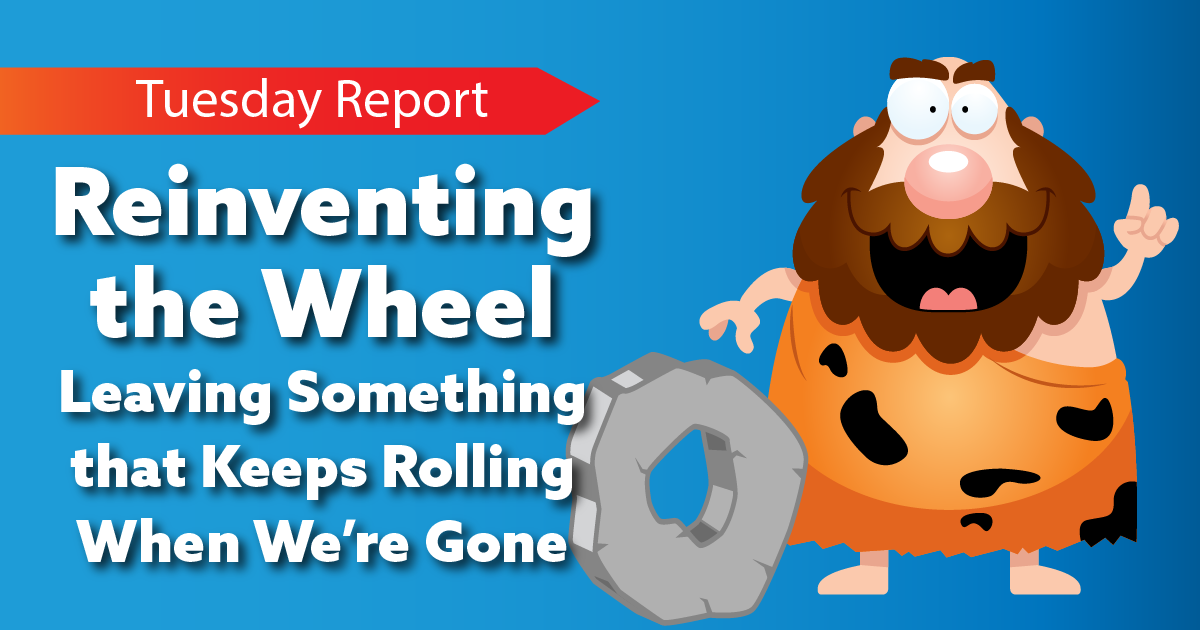Hi, Readers – This is a follow-up article to a Tuesday Report we ran in February entitled “Your Work is Your Worth? How Good at Your Job Do You Want to be?”
https://delta-associates.com/your-work-as-your-worth-how-good-do-yowant-to-be-at-your-job We are exploring what the meaning of work is in people’s lives today. This article is about personal motivation. Upcoming articles will deal with making workplaces somewhere a person would want to be. Jack
I don’t know who invented the wheel, but I’m glad they did. There is little that would happen in my life if it weren’t for the wheels turning on vehicles all over the world that bring me the stuff I need every day. Who invented the wheel? Nobody knows, so the credit is still up for grabs.
We love the way cartoonists portray some unnamed caveman inventing the wheel, but the wheel was actually invented way after our first ancestors. The wheel was apparently invented by people in the Middle East about 3500 years ago in the era of advanced civilizations.
Although we’ll never know the name of the ingenious person who carved out a hole in a round disc, and put a log through it, they profoundly changed the world forever. The nations that possessed the wheel won battles and traveled far. The nations who never got the wheel fell prey to those who had it.
The Nameless Greats that Left Us Gifts
We don’t know who most people were who invented and did the important things.
I grew up in Tomball Texas, USA, a very small town outside of Houston. In 1907 Thomas Ball was successful in getting the railroad to route through my hometown. There was a ceremony and they named the town after Thomas Ball. After the ceremony, he got on the train and was never heard from again, he never came back, and they still call the town Tomball.
The person, whoever they were, that invented the wheel is among the nameless greats that left us gifts. Unlike Thomas Edison, who invented the light bulb, we’ll never know the person. They’ll never be a known name like Thomas Edison or Steve Jobs.
So what does that have to do with you and me? We can be among those unnamed people who left gifts of permanent value to those we leave behind. Most of that value will be given in the role we play in life. Our legacy will be in the roles we play and how well we play them.
Our legacy will be what we leave to family and friends. I never invented a wheel, but what I did is embedded in the people I touched.
So how do leave those gifts? We accept the role of builders, and our lives are about building. If you accept this value, you’ll be taking a road that most people don’t follow. According to a recent Gallup poll, only about 20% of people are engaged in their jobs. 80% of people would just rather be somewhere else.
I would hate to pass this world being a part of the 80%. There are many people who are passionately engaged in building something of value that is not tied to their work, but I believe that if I am employed full time, I want to be part of the engaged 20%.
So what is it like to be engaged in a professional role that will leave a legacy of building?
- Find a Professional Role that Gives You Opportunity to Build. It doesn’t need to be a rocket ship to Mars. Our friend Clayton Christopher began brewing and delivering his grandmother’s recipe for iced tea which became the iconic Sweet Leaf Tea; he has since gone on to other consumer products like Deep Eddy Vodka and High Brew Coffee. You can feed, entertain, insure or serve, but anything you do must satisfy the need to build something of value that you value giving.
- Enlist a Mentor to Increase Your Skills. One of the most valuable professional advantages that I had in my early career were bosses and colleagues that knew more than I did and taught me. In today’s world, so many people are not open to people who can teach them. There are times that I need to sit down, shut up, and listen. Ask for advice from bosses, colleagues, and those around you whom you trust. I know some people who have told me they have never learned from those around them and I think that’s sad. Find an environment of people who can teach and mentor you.
- Find an Organization that Has a Mission You Believe in. You may have to take some lateral moves to find the
company with a mission you believe in, but keep moving until you find that organization. Find a generous organization that will invest in you and compensate you for outstanding work. - Know How What You’re Doing Relates to the Goals. You can work in an organization 14 hours a day and not really know how what you’re doing gets your organization to the goal line. Don’t fill a role where you can’t directly explain to your children how it increases revenue and market share. Be passionate about your organization’s goals.
I doubt if I’ll ever invent today’s equivalent to the wheel but I can reinvent how the wheel is used. In other words, I can apply things that already exist in new ways. Those of us who have been around for a while remember when we carried our suitcases or hired someone to do it. Then one day someone said, “You know, we could put wheels on suitcases.” I don’t know who thought of that or why someone didn’t think about it earlier. We can find simple approaches to age-old problems and we’ll create a legacy that will live on—even if they don’t remember our names.






